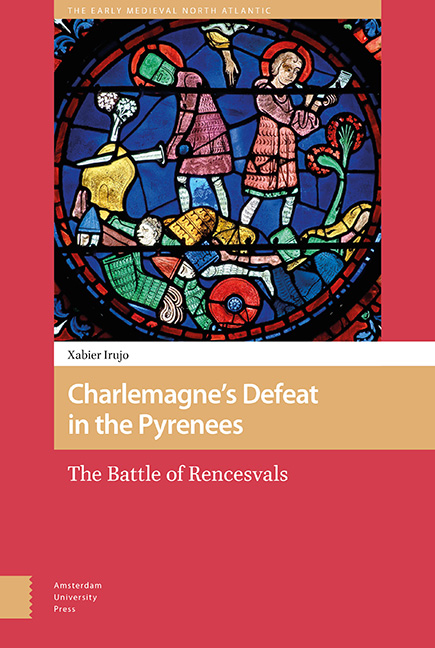4 - Consequences of the Battle
Published online by Cambridge University Press: 18 June 2021
Summary
Abstract
This chapter focuses on the study of the political, economic and military consequences of the battle, both for the Frankish Kingdom and the Emirate of Cordoba, between 778 and 824. The disaster of Rencesvals abetted the revolt in Saxony and the decisions taken by King Charles after the battle suggest that he perceived the situation as critical. Without the spoils of war, the economic cost of the king's unsuccessful campaign fell on the royal coffers. Politically, one of the first measures taken by King Charles was the administrative reorganization of the Frankish Kingdom. However, one of the most important consequences was the definitive consolidation of the Kingdom of Pamplona under King Eneko Aritza, architect of the political alliances that led to the victory over the Frankish in 824, at the Third Battle of Rencesvals.
Keywords: Charlemagne, Ludovico Pio, Vasconia, Pamplona, Eneko Aritza
The physical absence of the Carolingian army coupled with the news of their defeat led to the insurrection of other subjugated peoples. King Charles’ defeat in the extreme south of the kingdom stimulated Widukind’s uprising in Saxony and, quite possibly, it also fueled the political upheaval in Aquitaine and Lombardy. The Enhardi Fuldensis Annales records that Widukind's uprising proved particularly bloody and resulted in the destruction of Karlsburg ‘by iron and fire’. And the repression was likewise brutal, with episodes of massive killings and deportations of population over the course of several punitive military campaigns until the submission and baptism of the Saxon leader in 785.
As Francois-Louis Ganshof has indicated, the disaster of Errozabal abetted the revolt in Saxony and produced a critical situation, from both a purely military perspective as well as from a political and economic one.
As regards the economic consequences, the booty obtained from looting was one of the principal motivations for the Frankish annual military campaigns. As sources attest, the cost of the emperor's unsuccessful campaign fell on the royal coffer which was unable to count on the spoils of war. The sources record that upon his return to Herstal, the emperor had to face the additional economic burden of organizing a new army. We know also that on his way to Herstal he passed through Paris, most probably to stop in Saint- Denis and pay a visit to Abbot Fulrad, advisor of Pepin and Charlemagne from at least 750 until his death in 784.
- Type
- Chapter
- Information
- Charlemagne’s Defeat in the PyreneesThe Battle of Rencesvals, pp. 121 - 138Publisher: Amsterdam University PressPrint publication year: 2021



